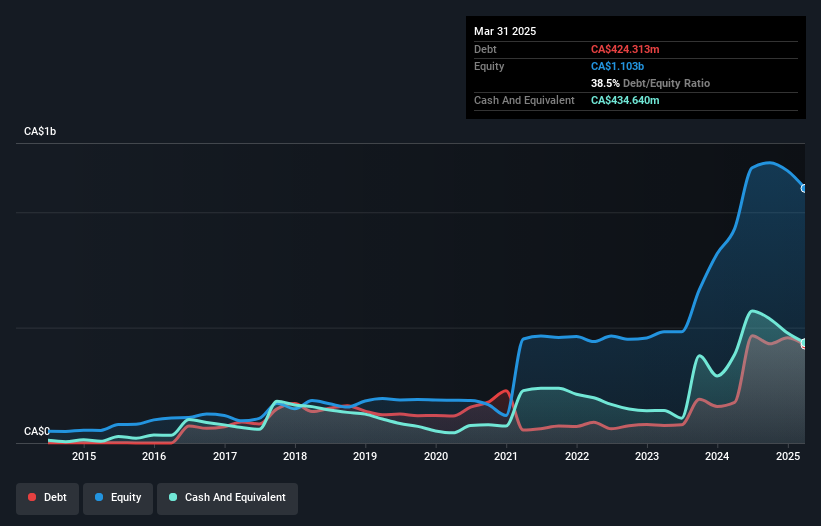Legendary fund manager Li Lu (who Charlie Munger backed) once said, 'The biggest investment risk is not the volatility of prices, but whether you will suffer a permanent loss of capital.' It's only natural to consider a company's balance sheet when you examine how risky it is, since debt is often involved when a business collapses. We note that NexGen Energy Ltd. (TSE:NXE) does have debt on its balance sheet. But the more important question is: how much risk is that debt creating?
Our free stock report includes 2 warning signs investors should be aware of before investing in NexGen Energy. Read for free now.When Is Debt A Problem?
Generally speaking, debt only becomes a real problem when a company can't easily pay it off, either by raising capital or with its own cash flow. Ultimately, if the company can't fulfill its legal obligations to repay debt, shareholders could walk away with nothing. However, a more frequent (but still costly) occurrence is where a company must issue shares at bargain-basement prices, permanently diluting shareholders, just to shore up its balance sheet. By replacing dilution, though, debt can be an extremely good tool for businesses that need capital to invest in growth at high rates of return. When we think about a company's use of debt, we first look at cash and debt together.
What Is NexGen Energy's Net Debt?
The image below, which you can click on for greater detail, shows that at March 2025 NexGen Energy had debt of CA$424.3m, up from CA$175.9m in one year. However, it does have CA$434.6m in cash offsetting this, leading to net cash of CA$10.3m.

How Strong Is NexGen Energy's Balance Sheet?
According to the last reported balance sheet, NexGen Energy had liabilities of CA$460.8m due within 12 months, and liabilities of CA$2.76m due beyond 12 months. Offsetting these obligations, it had cash of CA$434.6m as well as receivables valued at CA$1.46m due within 12 months. So its liabilities total CA$27.5m more than the combination of its cash and short-term receivables.
Having regard to NexGen Energy's size, it seems that its liquid assets are well balanced with its total liabilities. So it's very unlikely that the CA$4.54b company is short on cash, but still worth keeping an eye on the balance sheet. While it does have liabilities worth noting, NexGen Energy also has more cash than debt, so we're pretty confident it can manage its debt safely. The balance sheet is clearly the area to focus on when you are analysing debt. But it is future earnings, more than anything, that will determine NexGen Energy's ability to maintain a healthy balance sheet going forward. So if you want to see what the professionals think, you might find this free report on analyst profit forecasts to be interesting.
See our latest analysis for NexGen Energy
Given its lack of meaningful operating revenue, NexGen Energy shareholders no doubt hope it can fund itself until it can sell some combustibles.
So How Risky Is NexGen Energy?
Statistically speaking companies that lose money are riskier than those that make money. And we do note that NexGen Energy had an earnings before interest and tax (EBIT) loss, over the last year. And over the same period it saw negative free cash outflow of CA$141m and booked a CA$94m accounting loss. But the saving grace is the CA$10.3m on the balance sheet. That kitty means the company can keep spending for growth for at least two years, at current rates. Overall, we'd say the stock is a bit risky, and we're usually very cautious until we see positive free cash flow. There's no doubt that we learn most about debt from the balance sheet. However, not all investment risk resides within the balance sheet - far from it. Case in point: We've spotted 2 warning signs for NexGen Energy you should be aware of, and 1 of them can't be ignored.
At the end of the day, it's often better to focus on companies that are free from net debt. You can access our special list of such companies (all with a track record of profit growth). It's free.
Valuation is complex, but we're here to simplify it.
Discover if NexGen Energy might be undervalued or overvalued with our detailed analysis, featuring fair value estimates, potential risks, dividends, insider trades, and its financial condition.
Access Free AnalysisHave feedback on this article? Concerned about the content? Get in touch with us directly. Alternatively, email editorial-team (at) simplywallst.com.
This article by Simply Wall St is general in nature. We provide commentary based on historical data and analyst forecasts only using an unbiased methodology and our articles are not intended to be financial advice. It does not constitute a recommendation to buy or sell any stock, and does not take account of your objectives, or your financial situation. We aim to bring you long-term focused analysis driven by fundamental data. Note that our analysis may not factor in the latest price-sensitive company announcements or qualitative material. Simply Wall St has no position in any stocks mentioned.
About TSX:NXE
NexGen Energy
An exploration and development stage company, engages in the acquisition, exploration, evaluation, and development of uranium properties in Canada.
Excellent balance sheet with slight risk.
Similar Companies
Market Insights
Community Narratives


Recently Updated Narratives


MINISO's fair value is projected at 26.69 with an anticipated PE ratio shift of 20x


The Quiet Giant That Became AI’s Power Grid


Nova Ljubljanska Banka d.d will expect a 11.2% revenue boost driving future growth
Popular Narratives


The company that turned a verb into a global necessity and basically runs the modern internet, digital ads, smartphones, maps, and AI.


MicroVision will explode future revenue by 380.37% with a vision towards success



